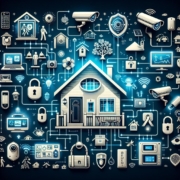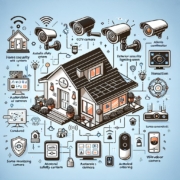Unlocking the Secrets: How to Safeguard Your Privacy with Smart Home Devices and Voice Assistants
The Rise of Smart Home Devices: Balancing Convenience with Privacy
In the modern era of technology, smart home devices have gained immense popularity for their ability to simplify tasks and provide efficiency. From voice assistants such as Alexa and Google Home to smart thermostats like Nest, these devices have become essential in our daily lives. However, along with their benefits come concerns regarding privacy and data security. This article will explore the privacy implications of popular smart home devices like Nest Thermostat, Amazon Echo, and Google Home.
Contents
Unpacking Privacy Concerns in Smart Home Devices
Privacy Challenges with Nest Thermostat
Nest thermostats are renowned for their energy-saving features and user-friendly design. Despite their advantages, some users have expressed worries about the data collected by these devices. Nest thermostats gather information about users’ daily routines, temperature preferences, and usage patterns to optimize energy usage. While this data is utilized to enhance the device’s performance, some users are apprehensive about potential privacy breaches.
To address these concerns, Nest offers a privacy mode that enables users to restrict the data collected by the thermostat. By activating this mode, users can safeguard their personal information and ensure its protection.
Addressing Privacy Issues with Amazon Echo
Amazon Echo has transformed the way we interact with our homes through voice commands and smart home integration. However, the constant listening feature of Alexa, the virtual assistant powering the device, has raised privacy concerns among users. Alexa continuously listens for its wake word, prompting the device to record and process commands.
To mitigate these privacy risks, Amazon provides users with various privacy settings to manage the data collected by Alexa. Users can delete voice recordings, set up PIN codes for voice purchases, and disable features that may compromise their privacy.
Safeguarding Data Privacy with Google Home
Google Home, equipped with the Google Assistant, offers similar functionalities to Amazon Echo, including voice commands, smart home control, and personalized recommendations. Nevertheless, Google’s extensive data collection practices have sparked privacy concerns among users. Google Home stores voice recordings, search history, and other data to enhance its services and deliver personalized experiences.
To uphold user privacy, Google offers tools and settings to regulate the data collected by Google Home. Users can review their activity history, delete voice recordings, and adjust privacy settings to restrict data sharing with third parties.
Prioritizing Personal Privacy with Smart Devices
As smart home devices become more integrated into our routines, it is imperative to prioritize privacy and security. Here are some strategies to enhance the privacy of your smart devices:
- Update Firmware: Regularly update the firmware of your smart devices to ensure they are equipped with the latest security patches.
- Create Strong Passwords: Utilize unique and robust passwords for each device to prevent unauthorized access.
- Review Privacy Settings: Take the time to assess and modify the privacy settings of your smart devices to manage the data they collect.
- Monitor Device Activity: Stay vigilant of the activity logs and notifications from your smart devices to detect any suspicious behavior.
- Disable Unused Features: Deactivate any features or services that are not in use to minimize data collection and potential privacy risks.
Final Thoughts
while smart home devices offer unparalleled convenience, it is essential to acknowledge the privacy implications associated with their usage. By familiarizing themselves with the privacy settings and features of devices like Nest Thermostat, Amazon Echo, and Google Home, users can proactively safeguard their personal information and data security. Adhering to best practices for smart device privacy can enable users to enjoy the advantages of these devices while mitigating privacy risks.












Leave a Reply
Want to join the discussion?Feel free to contribute!